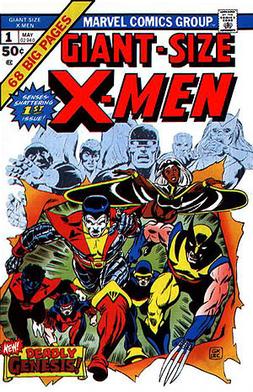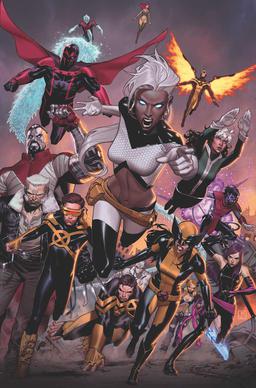X-Men
The X-Men are a fictional team of superheroes appearing in American comic books published by Marvel Comics. Created by writer Stan Lee and artist Jack Kirby, the team first appeared in The X-Men #1 in September 1963. The X-Men are mutants, a subspecies of humans who are born with superhuman abilities activated by the "X-Gene". The X-Men fight for peace and equality between normal humans and mutants in a world where anti-mutant bigotry is widespread.
Publication history[edit | edit source]
The X-Men were created by Stan Lee and Jack Kirby and first appeared in The X-Men #1 in 1963. The series introduced the original team of X-Men, consisting of Professor X, Cyclops, Marvel Girl, Beast, Angel, and Iceman, and their archenemy, Magneto.
Fictional team biography[edit | edit source]
The X-Men operate out of Xavier's School for Gifted Youngsters, a private academy in Westchester County, New York, which serves as a safe haven for mutants and a training ground for the X-Men. The team is led by Professor X, a powerful telepath who founded the school and the X-Men to promote peaceful coexistence between humans and mutants.
Original team[edit | edit source]
The original X-Men consisted of:
- Professor X (Charles Xavier) - Founder and leader, a powerful telepath.
- Cyclops (Scott Summers) - Field leader, with the ability to emit powerful energy blasts from his eyes.
- Marvel Girl (Jean Grey) - Telekinetic and telepathic abilities.
- Beast (Hank McCoy) - Superhuman strength and agility, later gains a blue, furry appearance.
- Angel (Warren Worthington III) - Possesses large feathered wings allowing flight.
- Iceman (Bobby Drake) - Ability to generate and control ice.
New team[edit | edit source]
In 1975, the series was relaunched with Giant-Size X-Men #1, introducing a new team of X-Men from various countries:
- Wolverine (Logan) - Enhanced senses, strength, and healing factor, with retractable claws.
- Storm (Ororo Munroe) - Ability to control the weather.
- Colossus (Piotr Rasputin) - Can transform his body into organic steel.
- Nightcrawler (Kurt Wagner) - Teleportation and enhanced agility.
- Banshee (Sean Cassidy) - Sonic scream.
- Sunfire (Shiro Yoshida) - Solar radiation manipulation.
- Thunderbird (John Proudstar) - Superhuman strength and durability.
Enemies[edit | edit source]
The X-Men face numerous adversaries, including:
- Magneto - A powerful mutant with the ability to generate and control magnetic fields.
- Sentinels - Mutant-hunting robots.
- Brotherhood of Mutants - A group of mutants who oppose the X-Men's peaceful approach.
Cultural impact[edit | edit source]
The X-Men have been adapted into various media, including animated television series, films, and video games. The film series, starting with X-Men in 2000, has been particularly successful, leading to numerous sequels and spin-offs.
Related pages[edit | edit source]
- List of X-Men members
- Xavier's School for Gifted Youngsters
- Magneto (Marvel Comics)
- Wolverine (character)
- Storm (Marvel Comics)
- Cyclops (Marvel Comics)
- Jean Grey
- Beast (Marvel Comics)
- Angel (Marvel Comics)
- Iceman (Marvel Comics)
| This article is a stub. You can help WikiMD by registering to expand it. |
Search WikiMD
Ad.Tired of being Overweight? Try W8MD's physician weight loss program.
Semaglutide (Ozempic / Wegovy and Tirzepatide (Mounjaro / Zepbound) available.
Advertise on WikiMD
|
WikiMD's Wellness Encyclopedia |
| Let Food Be Thy Medicine Medicine Thy Food - Hippocrates |
Translate this page: - East Asian
中文,
日本,
한국어,
South Asian
हिन्दी,
தமிழ்,
తెలుగు,
Urdu,
ಕನ್ನಡ,
Southeast Asian
Indonesian,
Vietnamese,
Thai,
မြန်မာဘာသာ,
বাংলা
European
español,
Deutsch,
français,
Greek,
português do Brasil,
polski,
română,
русский,
Nederlands,
norsk,
svenska,
suomi,
Italian
Middle Eastern & African
عربى,
Turkish,
Persian,
Hebrew,
Afrikaans,
isiZulu,
Kiswahili,
Other
Bulgarian,
Hungarian,
Czech,
Swedish,
മലയാളം,
मराठी,
ਪੰਜਾਬੀ,
ગુજરાતી,
Portuguese,
Ukrainian
Medical Disclaimer: WikiMD is not a substitute for professional medical advice. The information on WikiMD is provided as an information resource only, may be incorrect, outdated or misleading, and is not to be used or relied on for any diagnostic or treatment purposes. Please consult your health care provider before making any healthcare decisions or for guidance about a specific medical condition. WikiMD expressly disclaims responsibility, and shall have no liability, for any damages, loss, injury, or liability whatsoever suffered as a result of your reliance on the information contained in this site. By visiting this site you agree to the foregoing terms and conditions, which may from time to time be changed or supplemented by WikiMD. If you do not agree to the foregoing terms and conditions, you should not enter or use this site. See full disclaimer.
Credits:Most images are courtesy of Wikimedia commons, and templates, categories Wikipedia, licensed under CC BY SA or similar.
Contributors: Prab R. Tumpati, MD




